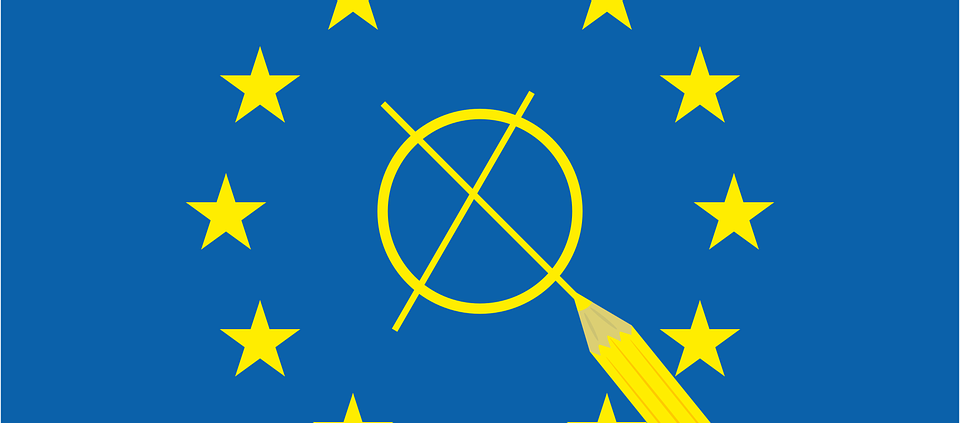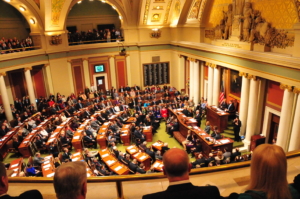What the EU Elections Mean for Business, Crypto-Mania, and Trouble in Y’allywood
Here’s What You Need To Know
Last week, voters across the European Union (EU) went to the polls to select their preferences for the bloc’s parliament. While readers in the United States may feel that the events across the pond have little or no bearing on the day-to-day operations of their company and the policy and regulatory issues important to it, the results of the EU elections could not only impact your interests now (particularly if your firm does business in Europe) but also foreshadow key trends that may appear stateside in the near future.
To help you prepare for the implications as the dust settles and a new EU emerges, here’s what the EU elections mean for your business interests:
- First, What Are The EU Elections? The EU elections occur every five years for citizens of EU Member States to choose their representatives in the 751-seat European Parliament, which gives them a say in the political debate and decision-making process at the EU level. The European Parliament is the second-largest democratic legislature in the world after India. For a supranational organization that regulates key policies ranging from data protection and privacy to immigration to trade and more, and with five-year terms for the elected Members of the European Parliament (MEPs) in which major unforeseen developments can unfold and need to be dealt with, the makeup of the body is crucial to influencing the policy outcomes that will follow in the near-term for both the EU and its Member States.
- The Pro-Business Middle Cedes Ground To The Populist Extremes: Approximately 50% of voters turned out in the bloc’s 28 countries (a 20-year high), and instead of the fear of many that the elections would result in a surge of far-right populists, the results were more “complicated.” Overall, there was a rise in the populist extremes with some countries seeing Eurosceptic parties gain ground to the detriment of more establishment parties such as in France, Italy and the U.K. In others, Greens and Socialists – just as the nationalist parties gained influence from the erosion of the traditional center-right parties – had strong showings, such as in Germany and Spain, to the detriment of the traditional center-right parties. For businesses, populist pressures from both ends of the political spectrum portend increased political risks from parties looking to deliver for their bases of support.
- Tech Is In The Crosshairs: Among the first targets for the new EU parliament may be the tech industry, which unites populist critics from the left and right in their desire to see more regulation. Indeed, EU commissioner for competition Margrethe Vestager – who has called to regulate and hold Big Tech accountable – is attracting broad support from across the political divide and could become the EU’s first female president. Should this come to pass, she could surely leverage her experience to elevate and implement tech regulation matters on the EU’s policy priorities. Coupled with the U.S. government’s gearing up for an antitrust probe of tech giants, companies in this space are facing risks from both sides of the Atlantic.
- Broad Regulatory Levers May Shape Health Care Policy: Pharmaceutical companies and chemical manufacturers (and industry more broadly) are expected to face greater pressure from the new European Parliament. This could likely include a focus on lowering costs of medicines through coercive regulation, as well as attacks to weaken intellectual property rights. In addition, with victories by the Greens and others on the populist left, it is expected that there will be greater ties between environmental and public health issues to implement policies that explicitly target industrial farming, chemical producers, the energy industry, and the pharmaceutical sector in the name of improving health.
- How Is The Outlook For Financial Services? With more chaos and more populists from both the left and the right in the EU Parliament, the financial sector can anticipate more uncertainty when it comes to the impacts they face from the policy and regulatory environment. The waning influence of the traditional centrist parties to ambitious newcomers ensures it. While calls for divestment from fossil fuels will continue to persist (and even grow stronger) and new regulations on industries and trade will require businesses to adapt, a range of other reforms and institutional adjustments, from financial literacy to transparency in financial products to post-Brexit rebalances, will need to be addressed and will almost immediately put pressure on companies also.
A common pattern we’ve noticed in the monitoring and analysis work we’ve done for our clients is that policies and regulatory frameworks pushed by influencers and stakeholders in continental Europe that take hold in the EU often make their way to other industrialized democracies, such as Canada, and then attempt to gain influence in the U.S. Because of this pattern, anticipating these trends stemming from the EU elections and other challenges will help companies operating globally navigate this uncertainty well and gain a competitive advantage. For those proactive firms focused on their businesses in the United States, this provides an opportunity to better stay ahead of developments that may be impacting operations domestically in the near future.
Subscribe to Receive Insights
"*" indicates required fields
News You Can Use
POLITICS DRIVING DEALS
You may have heard rumblings that French automaker Renault is considering merging with Fiat Chrysler—a rumor that caught many in the auto industry by surprise. But what if we told you the proposed merger is extremely politically calculated? By merging, Renault and Fiat Chrysler hope that their increased size will reduce the cost of complying with government mandates that require increasing electric-car production and improvements in battery technology.
Due to the added costs of compliance, many automakers (think: Toyota and Suzuki) have combined forces to take on Uncle Sam. Additionally, merging could allow Renault to avoid 25% tariffs on foreign autos that President Donald Trump has repeatably threatened. The potential Renault-Fiat Chrysler tie up is yet another example of politics and regulations driving companies in different industries to pursue mergers. And the result, of course, is less competition.
TROUBLE IN Y’ALLYWOOD
Netflix announced it will reconsider its “entire investment” in Georgia if a recently passed state law restricting abortion takes effect and has teamed up with the ACLU to fight the legislation in court. Georgia has recently become a hub for the film and TV industries and is the home of hit Netflix TV shows “Stranger Things” and “Ozark.” In fact, more than 450 film and TV projects were shot in Georgia last year, leading to over $4.5 billion in wages for an overall economic impact of $9.5 billion.
Prominent Hollywood stars such as Alyssa Milano, Amy Schumer, and Jason Bateman have already said they will “boycott Georgia” if the “heartbeat bill” goes into effect. It looks like Georgia could become the latest victim of America’s “boycott wars,” where people will gladly boycott a state or business over political differences. Netflix will keep filming in Georgia for now, but states and companies must realize it can only take a few activists to change the equation.
CRYPTO-MANIA
Representative Eric Swalwell (D-CA) recently became the second 2020 presidential candidate to begin accepting cryptocurrency donations, joining fellow presidential hopeful Andrew Yang. You read that right—presidential candidates are now accepting donations that cannot be traced back to the donor. Swalwell, who has been a fixture on cable news attacking the Trump campaign as “criminal” because of investigations into its inauguration spending, defended his campaign’s decision to accept difficult-to-track cryptocurrencies in a video claiming, “Government has to keep up with the times and the times have changed.”
Currently the cryptocurrency market in the U.S. is under very little oversight, but that could all change soon. Many U.S. regulators have called for a federal framework to oversee bitcoin and as more candidates accept cryptocurrency donations, Congress may be under increased pressure to act. For now, government transparency advocates and the public should be alarmed, and the cryptocurrency industry should worry about their reputational risk if foreign or corrupt sources use their systems to fund campaign activities illegally.
BRING ON THE VIRTUE SIGNALING
By now many of us have already weighed in on the “paper straw debate,” but what about Goldman Sachs’ decision to banish paper cups or candy-maker Mondelez’s efforts to make all wrappers recyclable by 2025? It seems that many companies are spearheading initiatives that, in the words of The Wall Street Journal’s Allysia Finley, are “costly and often counterproductive.” But why? Some would argue that they are trying to show employees, customers, and shareholders that they care about the environment.
Yet, there’s little evidence that these gestures benefit anyone or the environment – plastic straws only account for about 0.025% of the eight million tons of plastic that flow annually into the ocean (most of it from five countries in Asia). Companies not wanting to appease activists and shareholders citing environmental concerns could proactively message with these facts to illustrate the little impact such gestures have, to say nothing of the negative consequences “costly and often counterproductive” green initiatives can have on jobs.



